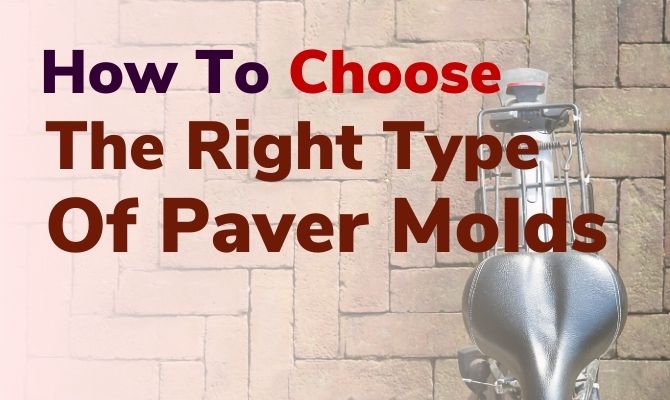- Get The Best Quality Molds From Us
- +91 9687244343
- +91 9687245001
- [email protected]

How to Manufacture the Best Quality Paver Block?
June 2, 2023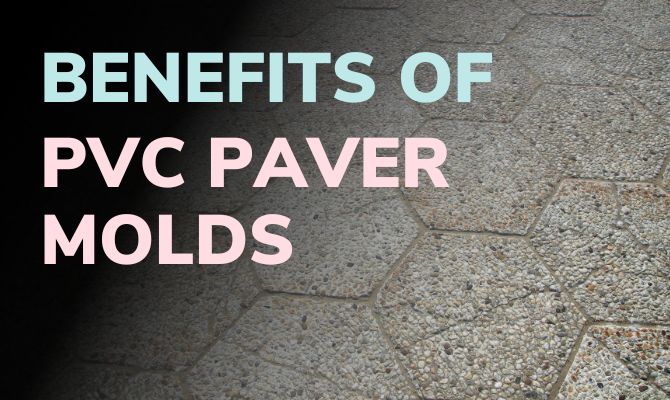
Benefits of PVC Paver Molds.
July 4, 2023PVC Paver Molds vs. Plastic Paver Molds
In this article, we will spot the differences between PVC Paver Molds & Plastic Paver Molds. We will also know which one is the better paver mold between the two.
Before we get into the core topic, let us first understand the need for paver blocks.
Need of Paver Blocks
Paver blocks have various benefits to them which makes them the best pavement option.
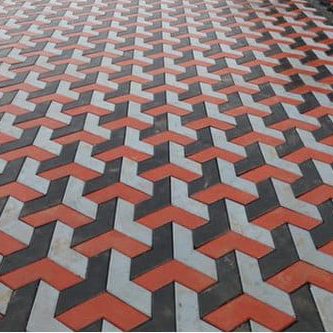
Paver blocks serve several important purposes and offer various advantages, which is why they are commonly used in construction projects. Here are some reasons why we need paver blocks:
1. Enhanced Aesthetics:
Paver blocks come in a wide range of shapes, colors, and patterns, allowing for creative and visually appealing designs. They can greatly enhance the aesthetic appeal of outdoor spaces such as driveways, walkways, and patios, giving them a more polished and finished look compared to plain concrete or asphalt surfaces.
2. Durability and Strength:
Paver blocks are designed to be durable and withstand heavy loads. They are made from concrete or other sturdy materials, which makes them strong and capable of enduring vehicular traffic, foot traffic, and outdoor weather conditions. Paver blocks are known for their longevity, making them a reliable choice for long-lasting paved surfaces.
3. Easy Installation and Maintenance:
Paver blocks are relatively easy to install compared to other types of paving materials. They can be laid on a compacted base without the need for extensive curing time. In case of damage or repairs, individual blocks can be easily replaced without disturbing the rest of the surface. Regular maintenance typically involves simple tasks such as sweeping, occasional pressure washing, or reapplying jointing sand.
4. Flexibility and Adaptability:
Paver blocks offer flexibility in terms of design and installation. They can be easily cut or shaped to fit different spaces, curves, or slopes, allowing for greater versatility in paving projects. Additionally, they can be easily reconfigured or expanded if the need arises, making them a practical choice for evolving landscapes.
5. Permeability and Drainage:
Some paver blocks are designed to be permeable, allowing water to infiltrate the ground rather than creating runoff. This helps with managing stormwater runoff, reducing the strain on drainage systems, and preventing water accumulation, which can lead to flooding or erosion. Permeable pavers can contribute to sustainable urban drainage systems and help maintain water balance in urban areas.
6. Safety and Functionality:
Paver blocks often have textured surfaces that provide better traction, reducing the risk of slips and falls, especially in wet or icy conditions. They can also be designed to accommodate proper drainage and prevent standing water, which can be hazardous. Additionally, paver blocks can be used to create delineated areas for pedestrian walkways, crosswalks, or parking zones, improving overall safety and organization.
These are just a few reasons why paver blocks are widely used and valued in construction projects. Their combination of aesthetics, durability, ease of installation, and functionality makes them a preferred choice for a range of outdoor paving applications.
Now that you have understood the need for paver blocks, let us understand the differences between PVC paver molds & Plastic Paver Molds.
PVC Paver Molds vs. Plastic Paver Molds
Paver block molds are the best way to manufacture the best quality paver blocks with ease. However, there are a lot of different qualities produced for paver block molds.
In the market, we have seen the best as well as the worst paver molds. Furthermore, we have seen plastic paver molds, rubber paver molds, PVC paver molds, & more.
PVC paver molds and plastic paver molds are both commonly used for creating paving stones or pavers. While both materials have their advantages and disadvantages, here’s a comparison between PVC paver molds and plastic paver molds:
1. Material:
PVC stands for polyvinyl chloride, which is a type of plastic. So, PVC paver molds are actually a specific type of plastic mold. On the other hand, when we refer to plastic paver molds, it generally includes a broader range of molds made from various types of plastics.
2. Durability:
PVC paver molds are known for their durability. PVC is a sturdy and long-lasting material that can withstand repeated use and various weather conditions. It is resistant to cracking, warping, and degradation over time. Plastic molds, however, are not made for long-term performance. They are significantly harder than PVC Paver molds and are more prone to breakage or wear and tear over a short period of time.
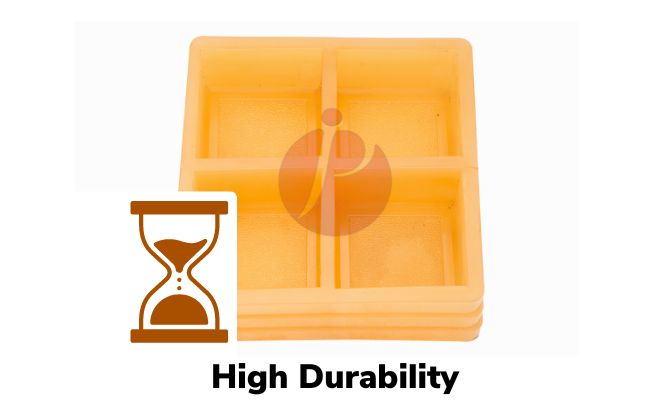
3. Flexibility:
PVC is generally more flexible than some other plastics used in paver molds. This flexibility makes it easier to de-mold the pavers once they have hardened. On the other hand, plastic molds in marketing are made harder to reduce the costs of production. As a result, the quality, durability & flexibility takes a hit.
4. Cost:
The cost of PVC paver molds is typically higher compared to most plastic paver molds. PVC is a premium material, and its durability and flexibility contribute to its higher price point. Plastic molds, depending on the type of plastic used and the manufacturing process, can be more affordable. As plastic molds are cheap, they are used for short-term projects.
5. Weight:
PVC paver molds are generally heavy, because of the density of the polymer granules. Plastic molds can vary in weight depending on the specific type of plastic used. Some plastic molds may be lighter, while others may be heavier.
6. Customization:
Both PVC paver molds and plastic paver molds can be designed and customized to create various shapes, sizes, and patterns of pavers. They can be used for different paving applications, such as walkways, driveways, or patios.
7. Quality:
PVC paver molds deliver the best quality articles as they are treated with vibrations. Moreover, they also provide the best finishing because of their smoothness in the molds. They deliver the best quality for a long time. On the other hand, plastic paver molds fail to deliver a good finish because of their fundamental properties. Over a period of time, the quality deteriorates.
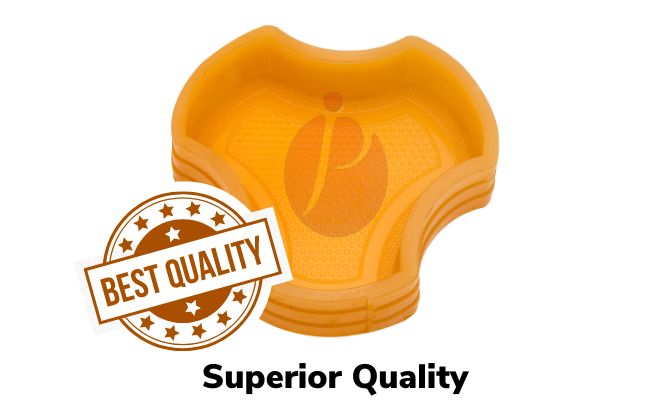
8. Reprocess & Resale Value:
The resale value of PVC paver molds is around 50% (based on the marketing average). As a result, the cost is again reduced and you can then reprocess the same paver molds to use them for another 4 years.
However, plastic paver molds are not at all reprocessed and as a result, there is no reselling in the market. It cannot be reprocessed because every time plastic is reprocessed, it gets harder than before. Furthermore, plastic paver molds are already hard enough that reprocessing them will make them so hard that they won’t de-mold the article.
| Differences | PVC Paver Molds | Plastic Paver Molds |
| Material | PVC | PP, HDPE, LDPE |
| Durability | 4-6 Years | 2-3 Months |
| Flexibility | Highly Flexible | Rigid & hard |
| Cost | Expensive | Cheap |
| Weight | Heavy | Light |
| Customization | Fully Customizable | Fully Customizable |
| Quality & Finishing | Best | Compromise |
| Resale & Recycle | 50% resale value & recyclable | 0% resale value & non-recyclable |
So which one of the two is the best?
We have seen the differences between the two types. Furthermore, we know what the features of the two qualities are.
Plastic paver molds are cost-effective and cheap. They are used for short-term projects and then are thrown away.
On the other hand, PVC paver molds provide the best properties and can also be reprocessed and resold. With great durability, flexibility & quality, PVC paver molds are the best choice for any paver block manufacturer in India.
Where to find the best PVC paver molds?
You can find the best PVC paver molds at J. P. Industries, Ahmedabad. J. P. Industries is the best paver molds manufacturer in India with over 15+ years of experience.

They have over 160+ designs in their catalog and have catered to around 3000+ customers. Having catered to around 30+ countries, they have the expertise to guide you with the paver block business.

